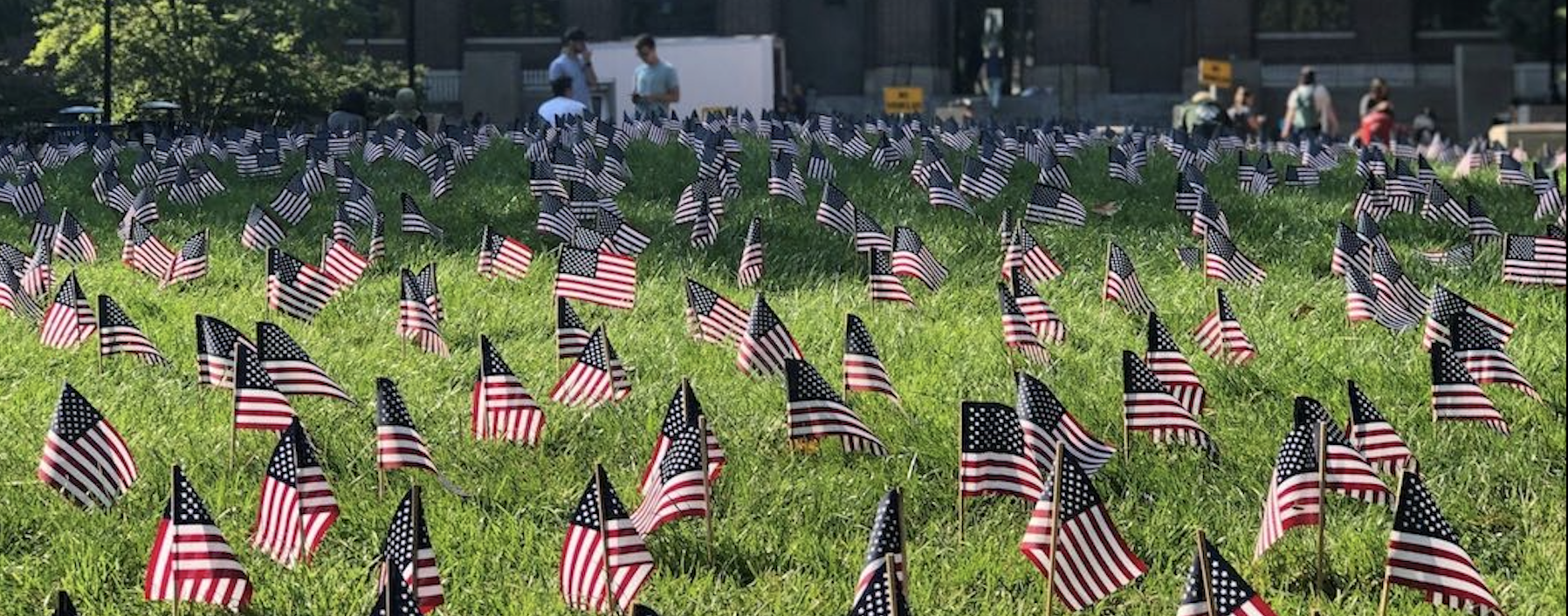On this year’s anniversary of the September 11th attacks, Young Americans for Freedom (YAF) planted 2,977 American flags on the Diag to commemorate each life lost. YAF Chairman Lincoln Ballew described the importance of her organization’s work: “The purpose of the event,” said Ballew, “is a memorial for the people whose lives were lost and so that the people on campus here don’t forget what happened on that day.”
Such a solemn tribute is both fitting for the anniversary and extremely important. Most of this year’s freshmen, such as myself, were born in 2001. I was three months old when the planes slammed into the towers. According to my parents, my mom saw the chyrons reporting the first impact on TV and called for my dad, who was with me upstairs. He rushed down with me in his arms and met my mom in our living room. Both of them were confused. They didn’t know if the first crash were a terrible accident or something malicious. As they were wondering, the second plane made impact. That was when they knew that they were witnessing a terrorist attack on American soil, so they say. But that’s all I have, stories. I don’t have memories of it happening, and next year’s freshman had not even been born yet.
For those of us who were born before the event but not long enough before to remember it, 9/11 is a weird feeling. It’s something that we’ve technically experienced, but lack the fresh memories and horrors of that day that many others do.
For those of us who were born before the event but not long enough before to remember it, 9/11 is a weird feeling. It’s something that we’ve technically experienced, but lack the fresh memories and horrors of that day that many others do. It’s not like the attack on Pearl Harbor or the assassination of JFK, but there’s still a profound disconnect with it. We have a different attitude and feeling toward the memory than our parents. The generations preceding us know what it’s like to live in a world before the events of that fateful day. They didn’t always have to take their shoes off or undergo full-body scans at airports. They were allowed to say goodbye to loved ones before they boarded the plane at the flight gates. For us, this life is all we know.
Additionally, it feels unfair for us to feel the same joy when the perpetrators are brought to justice as those who truly saw it. I remember the day that members of Seal Team Six killed Osama bin Laden. I was in fourth grade, and I had finished an art project that I was eagerly awaiting to bring into school. I was uniquely excited that day; there was a happy feeling that seemed to sweep across the nation. I woke up early and walked into the kitchen. I grabbed my project, but I was surprised to find that I was not the first one ready to start the day. Instead, I found my dad, his eyes glued to the TV. He snapped out of his enthrallment when he saw me, and he informed me of the news. I saw the broadcast on CNN, the videos of people gathering at the White House gates and chanting, “USA! USA!” It was a reversal of fortunes. Ten years earlier, my parents were met with images of shock and horror, but, on 2 May 2011, I saw those of triumph.
Reflecting back on the memories, I now see that I was the lucky one. Both my parents and I were allowed to feel the euphoria when we saw that justice had been served, but only they had to experience the despondency that afflicted America in the aftermath of the attacks.
Reflecting back on the memories, I now see that I was the lucky one. Both my parents and I were allowed to feel the euphoria when we saw that justice had been served, but only they had to experience the despondency that afflicted America in the aftermath of the attacks. This is not to say that we should feel some sort of guilt. Rather we should feel a duty to remember 9/11 because although we don’t personally have the terrible memories we have to live in the world it created. We must never forget 9/11, not only in order to learn why the world is the way it is, but also to understand why it happened. The better we understand these events and the ideologies that drove the event, the better we can avoid it in the future. Otherwise we are liable to see another day like that and condemn our children to inherit and correct the damage it causes.
